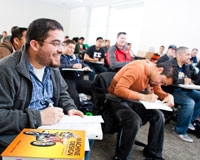MERCED, Calif. — The University of California, Merced, will report at the White House today (Dec. 4) on progress the campus is making in its efforts to support undocumented students, create career pathways to the Silicon Valley and advance other initiatives to help underserved students prepare for and succeed in college.
Chancellor Dorothy Leland, who unveiled the six initiatives during the first College Opportunity Summit in January, will again join representatives from other colleges and universities, First Lady Michelle Obama and officials from the National Economic Policy Council and the Department of Education.
 “UC Merced is proud to be a part of this prestigious and vitally important effort, and we are even prouder of the steps we have taken as a university to serve our students more effectively,” Leland said. “Every student has his or her own strengths, circumstances and challenges, and our job is to ensure they all have the tools, knowledge and support they need to succeed.”
“UC Merced is proud to be a part of this prestigious and vitally important effort, and we are even prouder of the steps we have taken as a university to serve our students more effectively,” Leland said. “Every student has his or her own strengths, circumstances and challenges, and our job is to ensure they all have the tools, knowledge and support they need to succeed.”
At today’s summit, UC Merced will report on the progress that has been made toward each of the six initiatives Leland outlined in January:
For its second College Opportunity Summit, the White House is also looking for new commitments from colleges and universities to help underserved students.
The UC Merced School of Engineering is committing to a significant curriculum overhaul, with an increased focus on entrepreneurship and innovation to help improve student retention. The School of Natural Sciences will create a series of workshops to train underserved students in the fundamental skills required for scientific research, thus better preparing them to step into on- or off-campus internships.
And the university, which already has above-average retention and graduation rates among low-income and underserved students, will develop a comprehensive retention plan that will include specific short- and long-term goals for continued improvement.
UC Merced is well positioned to lead on issues related to underserved students, as 60 percent of its undergraduates are Pell grant recipients and 62 percent are first-generation students. The university’s Fiat Lux Scholars Program has provided assistance and support to 368 low-income students in its first two years, and the campus also offers free tutoring, a first-year success course, special academic workshops, and mid-semester grades for all first- and second-year students.